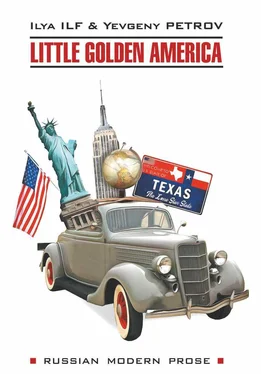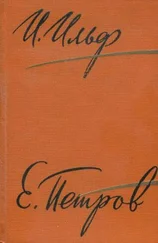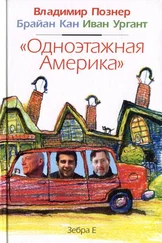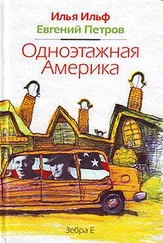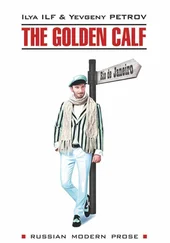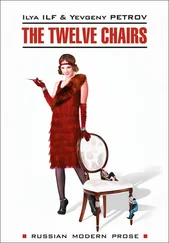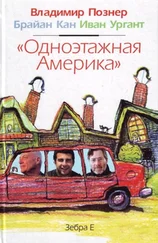It cannot be said that the lighting of Forty-second Street was mediocre. And yet Broadway, lighted by millions and perhaps even by billions of electric lamps, filled with swirling and jumping advertisements constructed out of kilometres of coloured neon tubes, appeared before us just as unexpectedly as New York itself rears up out of the limitless vacancy of the Atlantic Ocean.
We stood at the most popular corner in the States, at the corner of Forty-second and Broadway. The “Great White Way,” as Americans call Broadway, stretched before us.
Here electricity has been brought down (or brought up, if you like) to the level of a trained circus animal. Here it has been forced to make faces, to hurdle over obstacles, to wink, to dance. Edison’s sedate electricity has been converted into Durov’s trained seal. It catches balls with its nose. It does sleight-of-hand tricks, plays dead, comes to life, does anything it is ordered to do. The electric parade never stops. The lights of the advertisements flare up, whirl around, go out, and then again light up: letters, large and small, white, red, and green, endlessly run away somewhere, only to return a second later and renew their frantic race.
On Broadway are concentrated the theatres, cinemas, and dance halls of the city. Tens of thousands of people move along the pavements. New York is one of the few cities of the world where the population promenades on a definite street. The approaches to the cinemas are so brightly lighted that, it seems, if anyone were to add one more little lamp the whole thing would blow up from excessive light, all of it would go to the devil. But it would be impossible to squeeze in another little lamp; there is no room for it. The newsvendors raise such a howl that digging the voice out of it would require more than a week, more likely years of persistent toil. High in the sky, on some uncounted story of the Paramount Building, flared the face of an electric clock. Neither star nor moon was visible. The light of the advertisements eclipsed everything else. In the display windows, among simple crisscross neckties, small illuminated price tags turn around and go into a balancing act. These are the micro-organisms in the cosmos of Broadway’s electricity. In the tumultuous uproar a calm beggar plays his saxophone. A gentleman in a top-hat walks into a theatre, and with him is the inevitable lady, whose evening-gown has a train. A blind man led by a dog moves like a sleep-walker. Certain young men walk without hats. That is fashionable. Their neatly combed hair glistens under the street lamps. The odour of cigars, nasty ones and expensive ones.
At that very moment, when it occurred to us that we were so far from Moscow, before us floated the lights of the Cameo motion-picture theatre. The Soviet film, The New Gulliver , was being exhibited there.
The surge of Broadway carried us several times back and forth, and flung us into a side street.
We knew nothing yet about the city. Therefore, we cannot mention the streets here. We remember only that we stood under the trestle of an elevated railway. An autobus passed, and without much ado we boarded it.
Even several days later, when we began to orient ourselves in the New York whirlpool, we could not remember where the autobus took us that first evening. It seems to us that it was the Chinese section, but it is quite possible that it was an Italian or a Jewish section.
We walked along narrow, smelly streets. No, the electricity here was ordinary, not like a trained animal. It shone rather dimly, and it did not indulge in any hurdles. A large policeman stood against the wall of a house. On the cap over his broad, imperious face gleamed the silver shield of the City of New York. Having noticed the uncertainty with which we walked down the street, he came to us; but, receiving no inquiry, again returned to his vantage-point at the wall, ever the stiff and stately minion of the law.
From one shabby little house came dull singing. The man who stood at the entrance to the house told us that this was the night lodging of the Salvation Army.
“Who may sleep here?”
“Anyone. No one is asked his name. No one is asked about his occupation or his past. Here night lodgers receive bed, coffee, and bread free of charge. In the morning they also get coffee and bread. Then they are free to go away. The sole condition is that they must take part in the evening and morning prayers.”
The singing that reached us from the house gave evidence of the fact that at this very moment this sole condition was being fulfilled. We went in.
Previously, about twenty-five years ago, there was a Chinese opium smoking den in this dwelling. It had been a dirty and dismal den of iniquity. Since then it had become cleaner, but, while losing its erstwhile exoticism, it did not become less dismal. The upper part of the former den of iniquity was devoted to prayer meetings, while below, the sleeping quarters consisted of bare walls, a bare stone floor, and canvas folding cots. That odour of coffee and dampness, which is always a part of hospital and charity cleanliness, permeated all. In a word, this was an American staging of Gorky’s Lower Depths .
In this bedraggled hall the night lodgers sat stiffly on benches that came down in an amphitheatre toward a small stage. As soon as the singing stopped, the next number on the programme began.
Between an American national flag, which stood on the stage, and Biblical texts, which hung all over the walls, a pinkish old man in a black suit jumped like a clown. He talked and gesticulated with such passion that he gave the impression of selling something. Yet he was merely telling the instructive history of his life, telling about the beneficent crisis when he turned his heart back to God.
He had been a tramp (“as frightful a tramp as you, old devils!”), he had carried on horribly, had used profane language (“remember your own habits, my friends”), he stole – yes, all of that happened, too, alas! But now it was all done with. Now he owned his own home and lived like a decent man (“Hasn’t God created us in his own image, in his own manner?”). Not long ago he had even bought himself a radio receiving set. And all this he had received directly with the help of God.
The old man talked with extraordinary facility; it seemed therefore I hat he was now appearing for at least the thousandth time. He clicked his fingers, laughed hoarsely, sang religious ditties, and ended up with great enthusiasm, shouting:
“Let’s sing, brothers!”
Again the dull, humdrum singing began.
The night lodgers were appalling. Almost all of them were no longer young. Unshaven, with lustreless eyes, they swayed on their crude benches. They sang submissively and lazily. Some of them could not overcome the fatigue of the day, and slept.
We vividly imagined to ourselves the wanderings through the frightful places of New York, the days passed at bridges and warehouses, in the midst of garbage, in the everlasting nebulousness of human degeneration. To sit after that in a night lodging and sing hymns was sheer torture.
Then before the audience appeared a fellow as hale and healthy as a policeman. He had a lilac-coloured vaudevillian nose and the voice of a skipper. He was as bold and jaunty as anyone could possibly be. Again began a tale about the benefits of turning to God. The skipper, it seemed, had also been quite a sinner at one time. His fantasy was not great, however, and he soon ended up with the declaration that now, thanks to God’s help, he, too, had a radio receiving set.
Again they sang. The skipper waved his arms, displaying considerable experience as an orchestra leader. Two hundred men ground to powder by life again listened to this conscienceless twaddle. These poor people were not offered work, they were offered only God – a God as spiteful and exacting as the Devil.
Читать дальше
